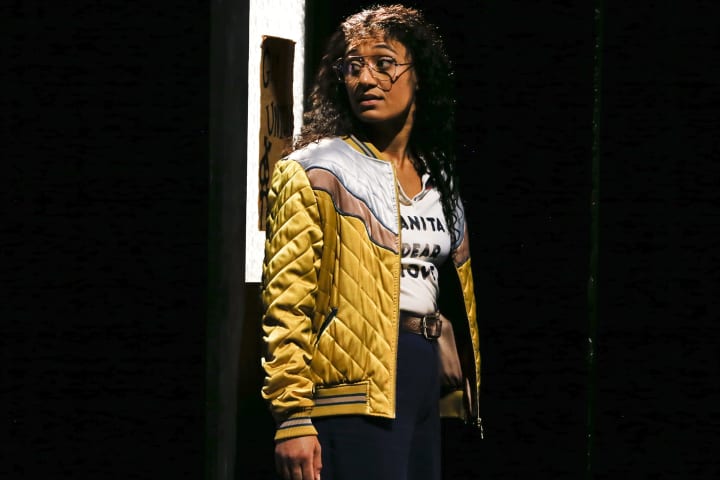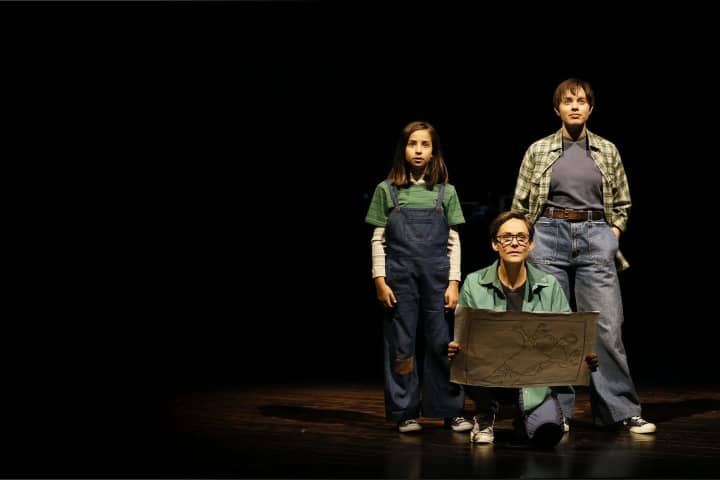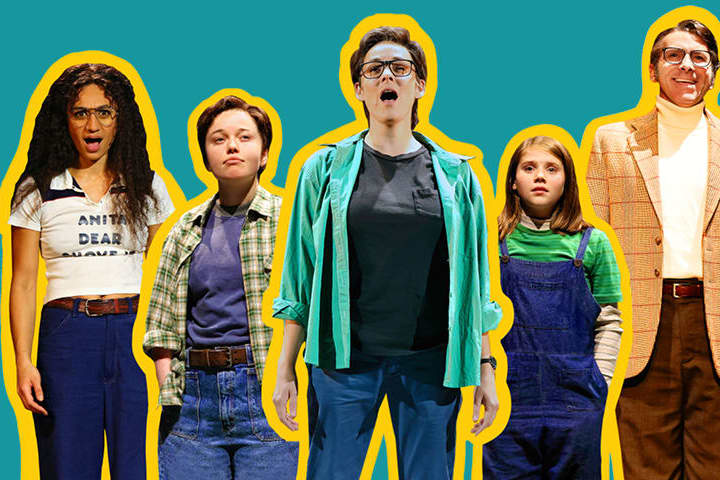As part of the Wheeler Centre's Postcards From Abroad series, Alison Bechdel joins Ronnie Scott for a conversation about strength and mortality, the meaning of family and the groundbreaking theatrical adaptation of her graphic novel Fun Home. Read this exclusive extract and then head to the Wheeler Centre to watch the full conversation, available to rent on-demand until 7 March 2022.
Ronnie Scott: Collaborating with others – whether that’s collaborating on colour or working on a musical – does that give you an appetite to shake up your creative process or the routine you’ve developed over time and over many books?
Alison Bechdel: A little bit. I can see that you can do more with different things when you have help. But I still tend to be a bit of a control freak. I really did not collaborate on the musical at all. I gave up all creative control and Lisa Kron and Jeanine Tesori and Sam Gold, who eventually directed it, were very kind to include me in various stages of the show as it evolved, but I didn’t have any contribution to it, that was all other people.
RS: Is that also a kind of freedom? There must be so many stages of letting go of this material, when you’ve been working on something personal, and then book production, publication. So I imagine the musical is just another stage in that, but such a large stage and such an involved stage for other creatives as well.
AB: It’s been such a strange thing. Having that story come out into the world in this other form. To actually see actors portraying my family, portraying me. The only word I’ve been able to come up with is surreal and I’ve said that word like a thousand times since I first saw the play. But surreal in a really magical way. I wish everyone could have a musical made about their childhood, because it’s really great. But I was happy to let go of it. I think the fact that it was in a quite alien form to me. Musicals are not something I know much about. I’m not a musical theatre aficionado by any stretch. That made it easier.
‘It’s always very moving for me to see the musical because music and live actors bring something incredible to a story, something that a comic could never do.’ – Alison Bechdel
RS: So yes there is a letting go of the story, but do you sort of decide that it is not you? Or is it still you, your life and your material being encountered by viewers and listeners, instead of readers?
AB: It is me, because they did such a wonderful job of adapting the book. They really adapted it in a way that feels accurate. So often adaptations miss the mark. They don’t capture whatever the essence of the thing is, but I felt from the start that this musical really did. It really captured something about the book and something about my actual life and family. Maybe I’m just being delusional or something but it really does feel like a faithful reproduction. And I know those actors on the stage aren’t me, but I feel that they are somehow an accurate enough representation that they do feel like me.
RS: The story of Fun Home is such a specific story. You could describe it in a paragraph, but it’s difficult to do without spoiling the story of the musical or the comic. But it’s a specific upbringing and a specific relationship to a father and to sexuality. Have you thought about what makes the story so universal and appealing to lots of different people who don’t have the same background as you? Is that to do with the way that the story is told?
AB: I feel like whatever it is that people respond to has to do with that point in life when you can really see your parents as an adult. You are seeing your parents as your adult self and understanding them in a way that you never could before. In my family that was really complicated, but in a very interesting way, as you say. Fun Home is about the way that my father and I both grew up in the same, small rural town and we were both gay. And I didn’t know that about him until I figured it out about myself. And when I came out to my parents it all started to come out. I had come along sharing this new and exciting information about myself. Little did I know that I was revealing something that was very painful and difficult and hidden for my parents. In a way it’s about these two different generations of queer people and how their lives turned out. My father did not have a good outcome and I have had a much better one. So even when I was pretty young – my father died when I was 19 – it struck me from that moment that this was kind of a remarkable story and I wanted to find a way to tell it.
RS: When I think instinctively about what the emotional centre of that story is, it’s maybe the process of realising that your own past, or your own history, is other than what you thought that it was, but also that sense that you can gain something and discover something and articulate something that can have great value to you. But it can also have unintended consequences and that’s a process of realising that your life is separate from your family’s as well as interrelated to your family’s. And to me that seems like such a complex thing to get across in a memoir but also in a musical. And yet, it is something so potentially powerful and maybe that is something that comes across in song and performance in a very raw way.
AB: It’s always very moving for me to see the musical because music and live actors bring something incredible to a story, something that a comic could never do. Comics have their own charms but there’s something about this live medium that is really emotionally powerful. It’s an interesting story though. The story isn’t just about my father and his death. The story is really about me telling a story. And somehow they found a way to dramatise that in the musical, which took a long time for them to figure out but makes it much more powerful. It’s not what happened so much that’s interesting, it’s the telling of the story.
This is an edited extract from Alison Bechdel: Drawing from Life, a Postcards From Abroad conversation hosted by the Wheeler Centre. The event takes place online and is available to rent on demand from Monday 7 February 6.30pm AEDT, until Friday 11 March 5pm AEDT. Visit the Wheeler Centre's website for more information.
Fun Home is on stage at Arts Centre Melbourne, Playhouse.
Published on 9 February 2022





